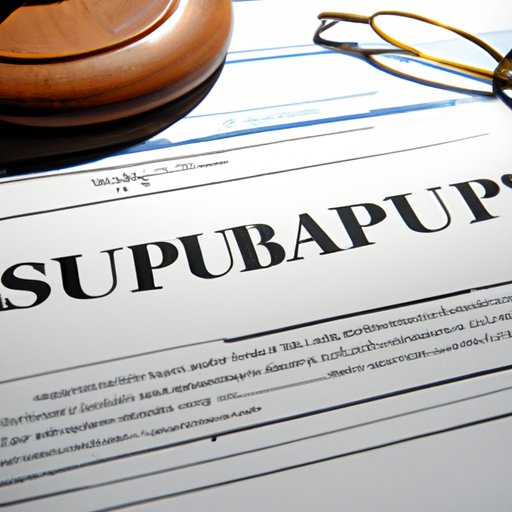Introduction
A subpoena is a court-ordered request for someone to appear in court or provide information. It is issued by a court with jurisdiction over the matter in question. While the term “subpoena” is often used interchangeably with “summons,” there are key differences between the two. A summons is a notice that a lawsuit has been filed against you and requires you to respond within a certain period of time. A subpoena, on the other hand, is an order from a court requiring you to appear in court or provide evidence. Receiving a subpoena can be an intimidating experience, leading many to wonder if it means they are in trouble.

Examining the Difference Between a Summons and a Subpoena
It is important to understand the difference between a summons and a subpoena. A summons is a document notifying you that a lawsuit has been filed against you and that you must respond within a certain period of time. On the other hand, a subpoena is an order from a court requiring you to appear in court or provide evidence. A subpoena can also be used to compel a witness to testify at trial or a deposition. According to attorney Michael Ehline, “A subpoena is like a summons, but instead of asking you to respond to a complaint, it orders you to appear in court or provide documents or other tangible evidence.”
The key difference between a summons and a subpoena is that a summons requires you to take action while a subpoena requires you to appear in court or provide evidence. This distinction is important because it can have a significant impact on your life. For example, if you are served with a summons, you must respond within the specified time frame. If you fail to do so, the court may enter a default judgment against you. If you are served with a subpoena, however, you must comply with the order or face potential penalties.
Investigating Whether Receiving a Subpoena Necessarily Means Trouble
Despite the fact that a subpoena is an order from a court, it does not necessarily mean that you are in trouble. There are a variety of reasons why a person might be subpoenaed, such as providing evidence in a criminal case or testifying in a civil suit. Being subpoenaed does not necessarily mean that you are a suspect in a criminal case or that you are being sued. It simply means that the court needs information from you.
It is also important to note that a subpoena does not always mean that you will have to appear in court. Depending on the type of subpoena, you may be asked to provide documents or other evidence without having to appear in court. In some cases, a lawyer may be able to handle the process for you so that you do not have to appear in court.
It is also important to dispel the misconception that a subpoena is a form of punishment. A subpoena is not a form of punishment. It is an order from a court requesting information or testimony, and if you fail to comply with the order, you may face penalties.
At the same time, it is important to understand that receiving a subpoena does not necessarily mean that you are in trouble either. Depending on the situation, a subpoena could be issued for a variety of reasons, such as providing evidence in a criminal case or testifying in a civil suit. In these cases, the subpoena is simply a way for the court to gather information.

Answering Common Questions About Subpoenas
When you receive a subpoena, there are several things you need to know. First, you should determine what type of subpoena you have received. Is it a subpoena duces tecum, which requires you to produce documents or other tangible evidence? Or is it a subpoena ad testificandum, which requires you to testify in court? Knowing the type of subpoena you have received will help you understand what is expected of you.
Next, you should determine whether you are required to appear in court or submit evidence. Depending on the type of subpoena, you may be required to appear in court or provide documents or other evidence. If you are required to appear in court, you should find out when and where the hearing will be held. You should also find out who will be present at the hearing, such as the judge, attorneys, witnesses, and jurors.
It is also important to determine whether you need to hire a lawyer. Depending on the situation, it may be beneficial to hire a lawyer to represent you. An attorney can help you understand your rights and responsibilities and provide advice on how to proceed. They can also represent you in court and ensure that your rights are protected.

Analyzing the Impact of Being Subpoenaed on Your Life
Being subpoenaed can have a significant impact on your life. The legal implications can be serious, and the emotional and financial impacts can be significant. It is important to understand the potential consequences of being subpoenaed and how to prepare for the process.
The emotional impact of being subpoenaed can be significant. The process can be stressful and overwhelming, and it can cause feelings of anxiety and fear. It is important to remember that being subpoenaed does not necessarily mean that you are in trouble, and that understanding the process and preparing for it can help alleviate some of the stress associated with the process.
The financial impact of being subpoenaed can also be significant. Depending on the situation, you may have to pay for an attorney and other fees associated with the process. Additionally, if you are required to appear in court, you may have to take time off work, which can result in lost wages.
Lastly, it is important to understand the legal implications of being subpoenaed. Depending on the situation, you may be required to provide documents or other evidence. If you are required to appear in court, you may be asked to answer questions under oath. Failure to comply with a subpoena can result in serious legal consequences.
Conclusion
Receiving a subpoena can be an intimidating experience, and many people wonder if it means they are in trouble. However, it is important to understand that being subpoenaed does not necessarily mean that you are in trouble. A subpoena is an order from a court requiring you to appear in court or provide evidence. The legal and life implications of being subpoenaed can be significant, so it is important to understand the process and prepare for it.
(Note: Is this article not meeting your expectations? Do you have knowledge or insights to share? Unlock new opportunities and expand your reach by joining our authors team. Click Registration to join us and share your expertise with our readers.)
